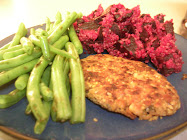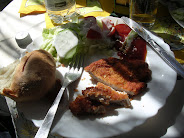I have been slowly telling my friends and my family about my decision to become a vegetarian. Reactions have not been out of the ordinary, but one conversation did leave me with something to think about. A friend of mine reacted by talking about how radical being a vegetarian seems in the context of American society. He views vegetarians as individuals who are very separate from the mainstream. The concept of vegetarianism has never been a foreign one to me and I have been surrounded by a handful of vegetarian friends for as long as I can remember. I am well aware of the fact that a typical American meal contains at least one large chunk of animal protein, but I would never have classified vegetarianism as "extreme" or "radical."
My vegetarian days are still very limited, but I am already starting to see how making this dietary decision places me on the very edge of mainstream culture. My students (most of whom are Navajo and butcher their own sheep) do not understand what a diet without meat consists of. Fast food restaurants (with the exception of Burger King) do not have vegetarian options. Other restaurants may have a few vegetarian options, but in the state of New Mexico everything is covered with chili and the chili is generally made with pork. As a meat eater, these are things that I may not have noticed before. Eating vegetarian is a conscious decision that takes some work and forethought to do successfully because the world is not always set up to accommodate this choice.
While avoiding meat is a very clear example of "opting out" of American food culture, there are many others as well. Thinking about Michael Pollan's prescriptions for eating healthier, all of them would entail "opting out" of food culture to an extent. Avoid processed foods with five or more ingredients - I don't know a single student who would turn down a bag of hot Cheeto's for that reason. Learn to cook - For many, cooking is a special occasion, it's not a daily occurrence. Convenience trumps the process of preparing food for most people. If one chooses to follow either of these two rules, they will be required to opt out of mainstream culture. This is radical. This is extreme. It doesn't take a vegetarian diet to cross over to the rebellious side of American food culture.
The question this leads me to is this: what does it take for people to opt out of a harmful food culture? Do they learn it at home? Do they learn it from coworkers and peers? Do they stumble across an article or a book that will change their mind? Or, will opting out always be simply a radical and extreme action... meaning in order to improve the general American's diet we'll have to change the food culture? If so, how in the world do we do that?
Wednesday, February 27, 2008
Subscribe to:
Post Comments (Atom)







No comments:
Post a Comment